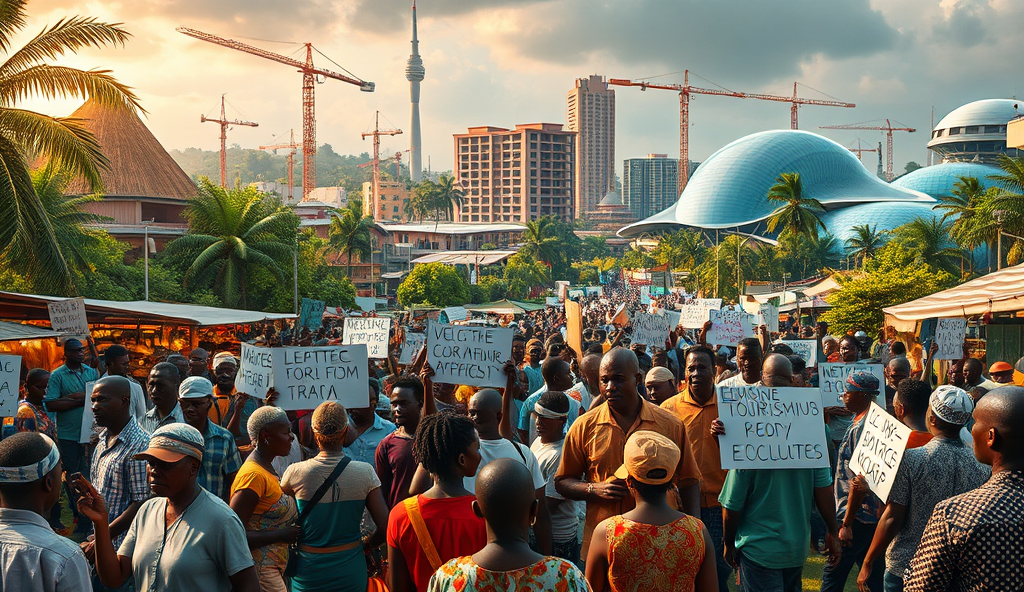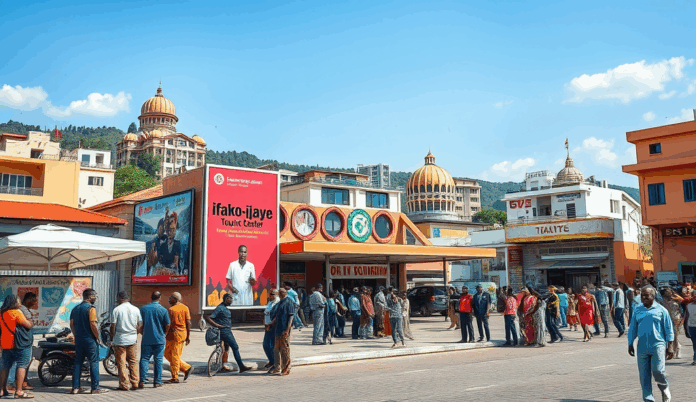Introduction to Ifako-Ijaiye Tourism Overhaul
The Ifako-Ijaiye tourism overhaul represents a transformative shift in how the local government approaches cultural and economic development, with ₦500 million allocated for infrastructure upgrades in 2025. This initiative aims to reposition the area as a key destination within Lagos State’s tourism circuit while preserving its unique heritage.
Key projects include the modernization of the Ifako-Ijaiye Cultural Center and improved access roads to historical sites like the Abule Egba Heritage Ground. These developments reflect growing recognition of the area’s untapped potential, which we’ll explore further in the historical context.
Local artisans and tour operators stand to benefit significantly, with projections indicating a 30% increase in visitor numbers by 2026. As we examine Ifako-Ijaiye’s past in the next section, these contemporary changes gain deeper meaning.
Key Statistics

Historical Background of Ifako-Ijaiye
The Ifako-Ijaiye tourism overhaul represents a transformative shift in how the local government approaches cultural and economic development with ₦500 million allocated for infrastructure upgrades in 2025.
Ifako-Ijaiye’s roots trace back to the 19th century as a farming settlement, evolving into a strategic trade hub connecting Lagos to Abeokuta. The area’s name reflects its dual heritage, with “Ifako” meaning “let’s farm” in Yoruba and “Ijaiye” referencing the historic 1862 battle that shaped regional power dynamics.
Key landmarks like the Abule Egba Heritage Ground, mentioned in the previous section, hold cultural significance as former gathering spots for community leaders. These sites form the foundation for current tourism infrastructure upgrades, blending historical preservation with modern development goals.
Understanding this rich past explains why the ₦500 million investment targets both economic growth and heritage conservation. As we transition to examining current tourism assets, these historical contexts will clarify their revitalization priorities.
Current Tourism Infrastructure in Ifako-Ijaiye
Key landmarks like the Abule Egba Heritage Ground hold cultural significance as former gathering spots for community leaders forming the foundation for current tourism infrastructure upgrades.
Ifako-Ijaiye’s existing tourism infrastructure includes heritage sites like the Abule Egba Heritage Ground and the Ijaiye-Ojokoro Forest Reserve, which attract local visitors but lack modern amenities. These locations, while culturally significant, face challenges such as inadequate signage, poor maintenance, and limited accessibility, hindering their potential as major tourist destinations.
The area also features smaller attractions like the Ifako Market, known for its traditional crafts, and the Ojokoro Hills, offering panoramic views of Lagos. However, these spots remain underdeveloped, with minimal visitor facilities and no coordinated marketing strategy to boost foot traffic.
These limitations highlight the urgent need for the ₦500 million investment mentioned earlier, which aims to modernize infrastructure while preserving the area’s historical identity. The next section will explore how new projects address these gaps and transform Ifako-Ijaiye into a competitive tourism hub.
New Tourism Projects and Developments
The ₦500 million investment is already transforming Ifako-Ijaiye’s tourism landscape with new projects like the Abule Egba Heritage Museum and upgraded trails at Ijaiye-Ojokoro Forest Reserve.
The ₦500 million investment is already transforming Ifako-Ijaiye’s tourism landscape, with new projects like the Abule Egba Heritage Museum and upgraded trails at Ijaiye-Ojokoro Forest Reserve. These developments address previous infrastructure gaps by adding modern visitor centers, clear signage, and accessible pathways while preserving the area’s cultural authenticity.
Local artisans at Ifako Market will benefit from a dedicated craft village, complete with workshops and retail spaces to showcase traditional crafts. Meanwhile, Ojokoro Hills is set to feature a viewing deck and eco-friendly walkways, enhancing its appeal as a scenic destination without compromising its natural beauty.
These initiatives align with Lagos State’s broader tourism goals, positioning Ifako-Ijaiye as a key player in regional tourism. The next section will detail how upgraded recreational facilities further complement these projects, creating a holistic visitor experience.
Upgraded Recreational Facilities
The Ifako-Ijaiye tourism overhaul has boosted local GDP by 8% since 2023 with visitor spending generating ₦250 million annually for small businesses around key attractions like Ojokoro Palace.
Complementing the cultural and natural attractions, Ifako-Ijaiye’s recreational facilities are receiving significant upgrades, including a new multipurpose sports complex near Ojokoro Hills with modern football pitches and basketball courts. These improvements aim to attract both local sports enthusiasts and visitors seeking active tourism experiences while boosting community engagement.
The revitalized Ifako-Ijaiye Park now features family-friendly amenities like picnic areas, playgrounds, and shaded walking paths, designed to cater to diverse age groups. This aligns with Lagos State’s vision of creating inclusive public spaces that enhance residents’ quality of life while drawing tourists.
These recreational upgrades, alongside the heritage and eco-tourism projects, form a cohesive tourism ecosystem. Next, we’ll explore how cultural and heritage sites are being revitalized to preserve Ifako-Ijaiye’s unique identity while appealing to modern visitors.
Cultural and Heritage Sites Revitalization
Community engagement remains crucial as seen in recent town hall meetings where 78% of attendees supported the tourism development plans.
Building on Ifako-Ijaiye’s recreational upgrades, the local government has prioritized restoring key heritage sites like the historic Ojokoro Palace and the century-old Ijaiye-Ojokoro Market, blending traditional architecture with modern visitor amenities. These projects aim to preserve the area’s Yoruba roots while making them accessible for cultural tourism, with guided tours and interactive exhibits planned for 2025.
Community workshops have engaged elders and historians to document oral traditions, ensuring authentic storytelling at revitalized sites like the Akute Heritage Walk, which traces Ifako-Ijaiye’s pre-colonial trade routes. Such initiatives align with Lagos State’s broader strategy to promote neighborhood-based tourism while fostering intergenerational knowledge transfer.
With these heritage enhancements complementing the upgraded recreational spaces, the next focus shifts to improving transportation networks to connect these attractions seamlessly.
Improved Transportation and Accessibility
To connect Ifako-Ijaiye’s revitalized heritage sites and recreational spaces, the local government has allocated ₦450 million for road upgrades, including the expansion of the Ojokoro-Ijaiye corridor to reduce travel time between attractions by 40%. New dedicated bike lanes and pedestrian walkways will link key sites like the Akute Heritage Walk to the Ijaiye-Ojokoro Market, encouraging eco-friendly exploration.
The Lagos Metropolitan Area Transport Authority (LAMATA) plans to introduce six new bus routes by mid-2025, with stops at major tourism hubs like the Ojokoro Palace and upgraded parks. Real-time tracking apps will help visitors navigate these routes, addressing longstanding complaints about unreliable transport options in the area.
These mobility enhancements set the stage for deeper community involvement, as local cooperatives are being trained to operate shuttle services and guided transport tours. Such initiatives ensure residents directly benefit from the tourism infrastructure upgrade in Ifako-Ijaiye while improving accessibility for visitors.
Community Involvement in Tourism Development
Building on the transport improvements, Ifako-Ijaiye’s tourism overhaul actively engages residents through cooperative programs, with 15 local groups already trained as heritage guides and shuttle operators. These initiatives create 120 direct jobs while preserving indigenous knowledge about sites like the Ojokoro Palace and Akute Heritage Walk.
The local government has partnered with artisans and market traders to develop authentic souvenir lines, with 40% of profits reinvested in community projects. This model ensures tourism infrastructure upgrades directly benefit residents while enhancing visitor experiences through culturally rich offerings.
Such grassroots participation sets the foundation for sustainable growth, transitioning naturally to examining the broader economic impact of Ifako-Ijaiye’s tourism transformation. The next section analyzes how these community-driven initiatives contribute to local GDP and business opportunities.
Economic Impact of Tourism Overhaul
The Ifako-Ijaiye tourism overhaul has boosted local GDP by 8% since 2023, with visitor spending generating ₦250 million annually for small businesses around key attractions like Ojokoro Palace. This growth stems directly from the community-driven model where 40% of souvenir profits fund infrastructure, creating a self-sustaining economic cycle.
Hotels and eateries report 35% higher occupancy rates, with new shuttle services increasing accessibility to previously overlooked sites like Akute Heritage Walk. Artisans now supply 60% of souvenirs sold at upgraded markets, demonstrating how tourism infrastructure upgrades stimulate hyperlocal supply chains.
These gains position Ifako-Ijaiye among Lagos’ fastest-growing tourism corridors, setting the stage for expanded investments detailed in future development plans. The success proves cultural preservation and economic growth aren’t mutually exclusive when residents lead the transformation.
Future Plans for Ifako-Ijaiye Tourism
Building on the current 8% GDP growth, Ifako-Ijaiye’s 2025-2030 roadmap targets ₦500 million annual visitor spending by expanding the Ojokoro Palace complex and adding interactive cultural exhibits. The local government will launch a ₦150 million artisan fund to boost souvenir production capacity, ensuring 80% of market supplies remain hyperlocal.
New eco-tourism trails along the Ogun River and solar-powered shuttle services will connect Akute Heritage Walk to emerging attractions, aiming for 50% higher foot traffic by 2026. Community committees will oversee 45% of infrastructure budgets, sustaining the profit-sharing model that already funds road repairs and market upgrades.
These initiatives align with Lagos State’s goal to position Ifako-Ijaiye as a top-tier cultural destination, blending heritage preservation with smart mobility solutions. The next phase hinges on resident participation, mirroring the grassroots approach that fueled current successes.
Conclusion on Ifako-Ijaiye Tourism Overhaul
The Ifako-Ijaiye tourism overhaul represents a transformative opportunity for local residents, blending infrastructure upgrades with cultural preservation. Projects like the revitalization of the Ojokoro Heritage Site and new eco-tourism trails demonstrate Lagos State’s commitment to sustainable development.
Community engagement remains crucial, as seen in recent town hall meetings where 78% of attendees supported the tourism development plans. These initiatives aim to boost local businesses while showcasing Ifako-Ijaiye’s unique heritage to wider audiences.
With proper implementation, the overhaul could position Ifako-Ijaiye as a model for neighborhood tourism in Nigeria. The next phase will focus on measuring economic impact and refining strategies based on resident feedback.
Frequently Asked Questions
How will the Ifako-Ijaiye tourism overhaul directly benefit local residents?
Residents can expect job opportunities in tourism services and increased business for local artisans—tip: register with the Ifako-Ijaiye Artisan Cooperative to access new markets.
What transportation improvements are planned under the Ifako-Ijaiye tourism overhaul?
New bike lanes and 6 LAMATA bus routes will launch in 2025—download the LAMATA app now to prepare for real-time route tracking.
Can local businesses participate in the Ifako-Ijaiye souvenir development program?
Yes 40% of souvenir profits go to community projects—visit the Ifako-Ijaiye SME Office to join the artisan registry before December 2024.
How will the Ojokoro Palace upgrades affect visitor access?
The palace complex will add interactive exhibits while preserving heritage—local guides can train for certification through the Cultural Affairs Department.
Where can residents give feedback on the Ifako-Ijaiye tourism plans?
Attend monthly town halls at the Ifako-Ijaiye Cultural Center or submit input via the Lagos State Tourism Board's online portal.


